The automobiles of today are intricate devices, composed of an array of systems that all collaborate to produce the intended functioning. Nonetheless, this sophistication increases the likelihood of malfunction. The array of warning indicators displayed on the dashboard to signal varying issues may be a lot to take in, particularly for individuals new to driving.
Green lights indicate system activation, while yellow or amber indicates mild conditions but depends on the vehicle’s make. The red ones are warnings of severe faults. You should learn all about them to enhance your safety and reduce maintenance costs.
We will cover common warning lights on most vehicle models in this post. Check them out!
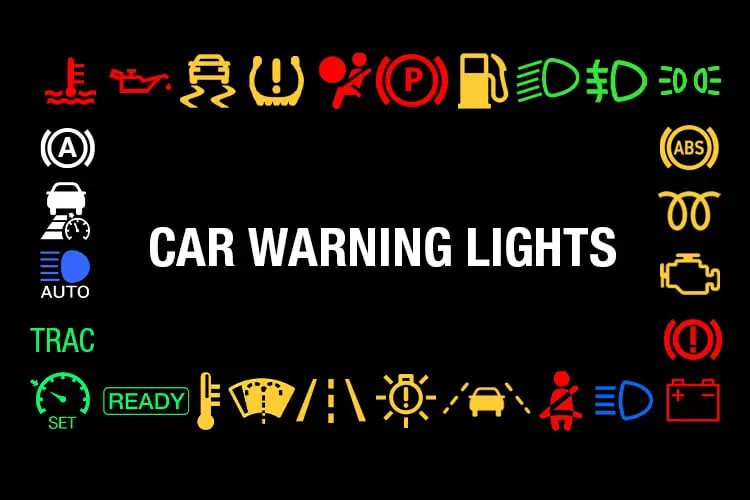
20 Common Dashboard Warning Lights
Oil Pressure Light
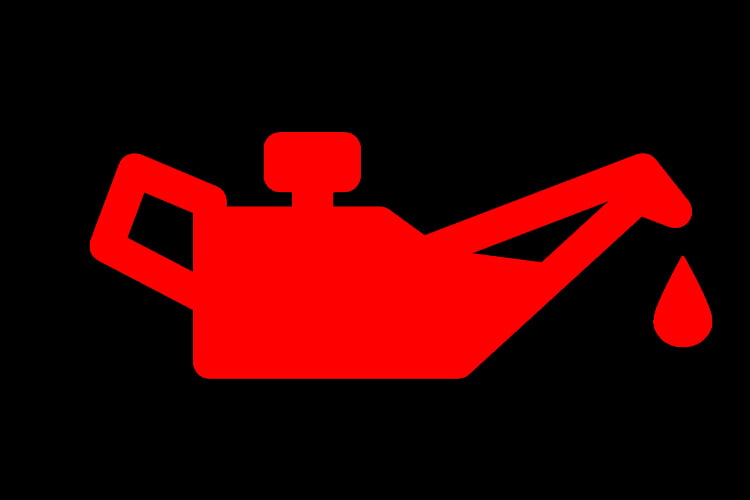
The oil pressure light is one of the ted symbols that can illuminate the dashboard. It’s represented by an old-fashioned can, which simply indicates a low oil pressure or low oil level. The latter is distinguished from the former by a wavy line that appears below the oil can.
An oil pressure light can indicate that your pump has malfunctioned and cannot supply all the systems that need lubrication with oil. A low level can also indicate an oil leakage. Whatever the case, the issue requires immediate attention.
Tire Pressure Monitor Indicator
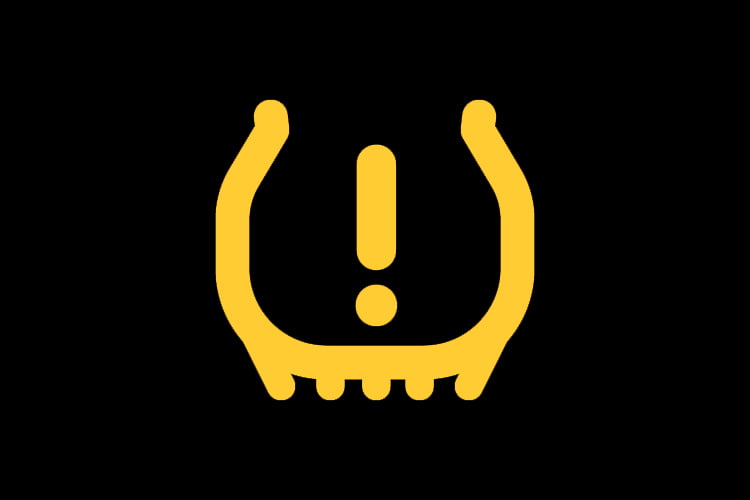
The Tire pressure monitor sensor (TPMS) warning symbol is yellow or amber. It’s sometimes referred to as a flat-tire monitor, but it doesn’t necessarily come on when you have a flat tire. The tire pressure monitor indicator is triggered when tire pressure in one or more wheels is 25% below or above the recommended level.
Most vehicles have a recommended tire pressure of between 30 and 35 psi. This value should be indicated in the car user manual. So, just check it and ensure that your tire pressure is always within the range.
READ MORE: Why Is My Car AC Making Hissing Noise?
Engine Temperature Indicator
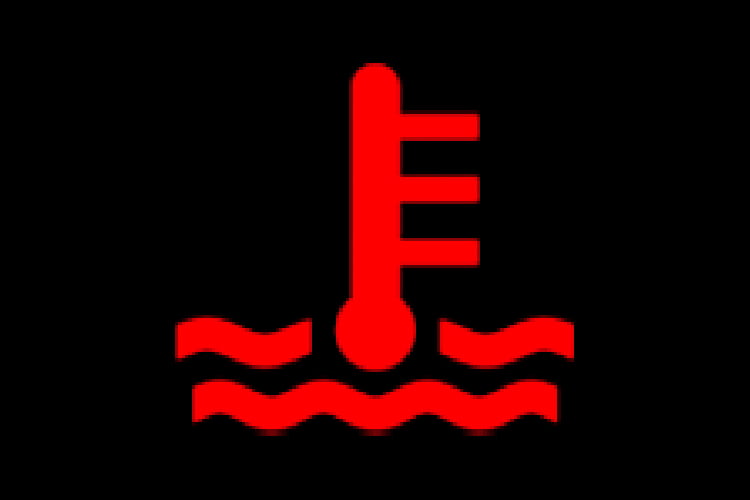
Engine temperature indicator light is a red symbol with a thermometer that’s seemingly inserted in a hot liquid. It simply indicates that your engine is overheated, resulting from coolant-related problems. This warning light can also be triggered by other faults.
The engine temperature indicator is severe and should be addressed immediately. Otherwise, you will have more damages that are expensive to fix.
ESP/BAS
ESP and BAS are yellow signs. They turn on to indicate a fault with the Electronic Stability Program or Brake Assist System, or both.
In some cases, ESP/BAS light comes on and then goes out on its own. If it doesn’t, see an auto mechanic. It’s not a severe case, but you should have your vehicle fixed as soon as possible.
Anti-lock Brake
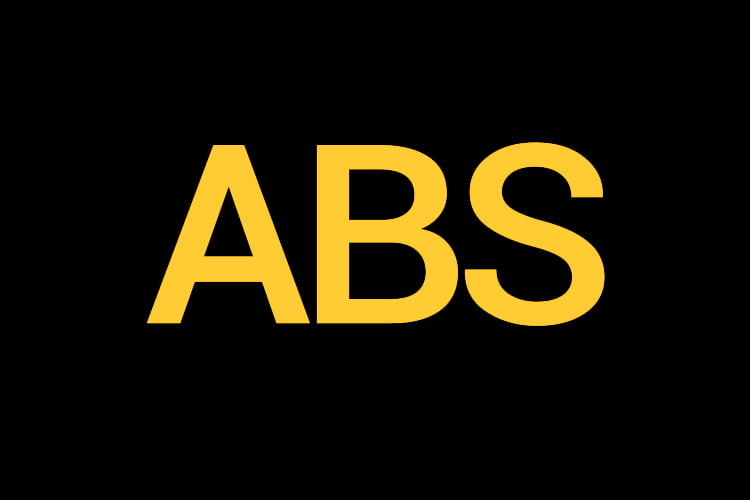
The anti-lock brake or ABS warning light is yellow but can also turn red with a circle around the three letters. It usually comes on when there’s an issue with your anti-lock brake system, which can be a faulty speed sensor or the module itself.
ABS improves your braking system on slippery roads by preventing the wheels from locking. The brakes should work just fine after this warning light illuminates the dashboard. However, you can experience reduced emergency brake performance. So, you should see a mechanic as soon as you can.
Check Engine Light
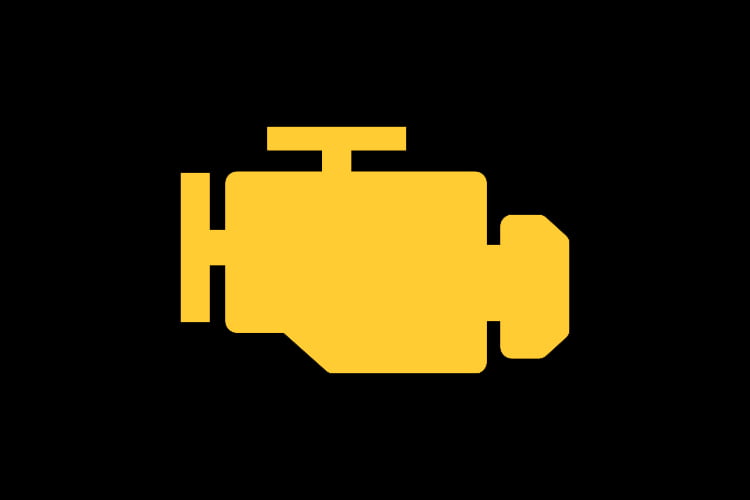
The Check Engine Light or Malfunction Indicator Light (MIL) illuminates if there is any engine-related problem. It can be yellow or red, depending on the severity. In some vehicle models, the MIL flashes to show that the issue requires immediate attention.
Check engine light has an outline of the engine and may have some words such as “check engine” and “service engine.” It can indicate a simple problem such as loose gas caps or an underlying problem that can potentially damage your engine if not addressed on time.
Low Fuel Indicator
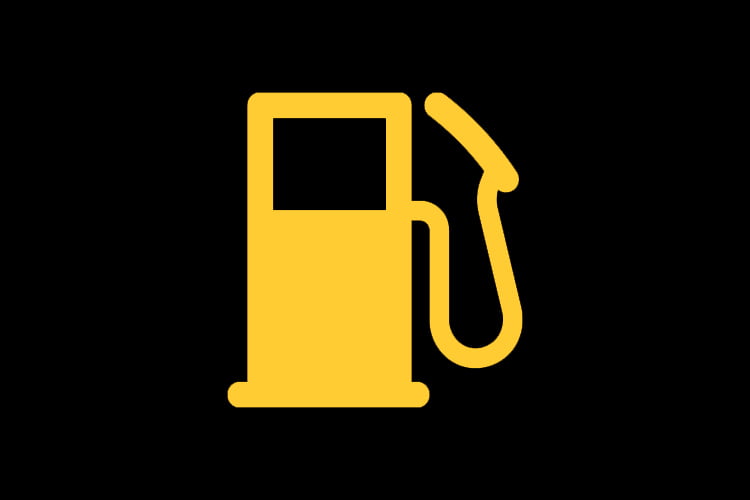
This is one of the famous dashboard symbols known to even one-time drivers. It’s a yellow fuel tank symbol, which may turn red or flash when you almost run out of gasoline. The low fuel indicator simply tells you to pull over at a nearby petrol station and refill. That should be done if your journey is long or if you are heading home.
Seat Belt Reminder
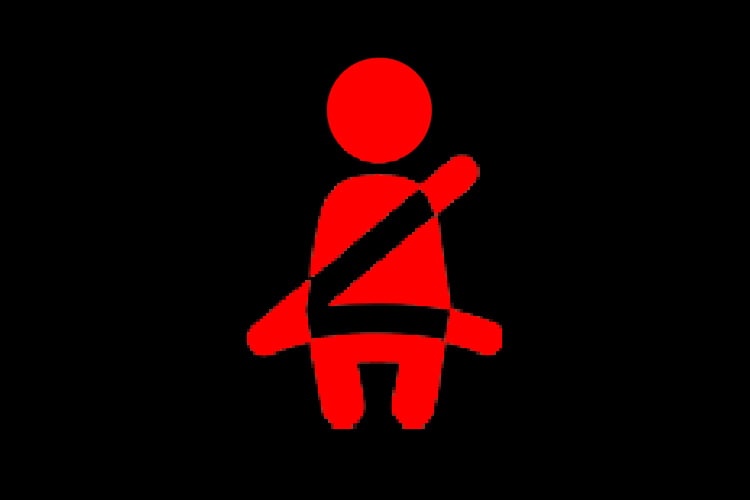
Seat belts are among the safety features in every car that reduce the severity of accidents and can possibly save a life. The seat belt reminder light is red and has a symbol of a buckled-up passenger. It simply reminds you or your passenger to have their seat belts buckled and fastened.
You don’t have to see a mechanic for this symbol unless the light doesn’t go off after buckling. It may indicate a fault with the sensors inside the buckle or something related to it.
Airbag Indicator

An airbag is a component of a Supplemental Restraint System (SRS), which is another safety feature. It deploys when you are milliseconds away from an accident. It’s yellow in color, warning you that there’s a problem with the SRS. That may mean that your airbag may not deploy as intended just before an accident. Drive to an auto repair shop to have it fixed.
Battery Alert
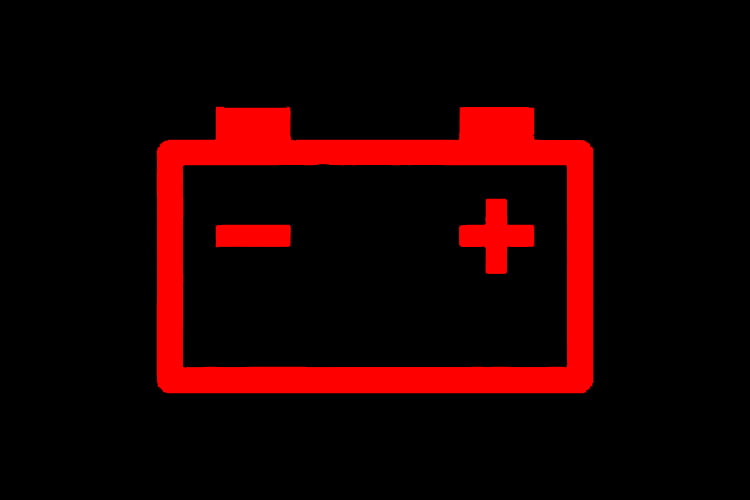
This red battery symbol comes on the dashboard if there’s a fault with the charging system. If the battery is not charging or over-drained, this alert warning may appear. Your vehicle may not be charging if the leads are corroded, broken wire, or a faulty alternator.
You may continue driving safely on the road, but your next stop should be at the mechanic. Your engine may not restart if you stop it with the battery alert still on.
READ MORE: Best 12V Battery Charger: Top 10 Picks 2021 (Review and Buying Guide)
Brake Trouble Indicator
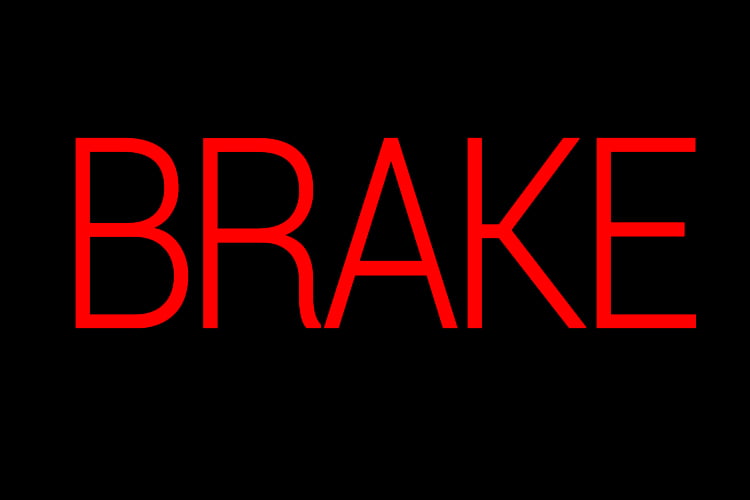
Brake trouble indicator or brake warning light illuminates red on the dashboard with either an exclamation point or P or BRAKE. It usually comes on if a handbrake, emergency brake, or parking brake is engaged. If it’s still on after releasing brakes, it means there is an issue with your braking system. Don’t head to the roads in such a condition. Instead, call a mechanic to repair it.
Fog Lamp Indicator

The fog lamp indicator comes on when fog lights are engaged. That should only be done where there is compromised visibility due to weather conditions, usually less than 100 yards. Don’t turn it on unnecessarily, as you will distract other drivers.
Expect the fog light lamp to come on every time you switch the fog light on. If it doesn’t, you may need to have the system checked.
READ MORE: What is the best color temperature for your headlights?
Windshield Washer Fluid Indicator
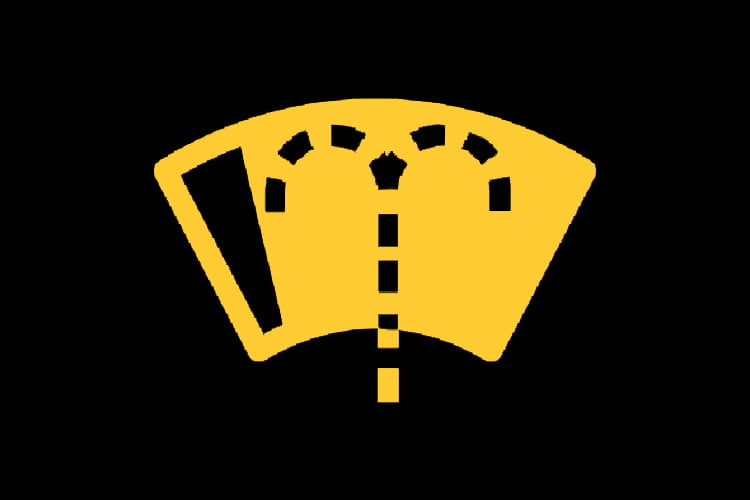
The windshield washer fluid indicator lamp is yellow-colored, taking the shape of your windscreen and an active wiper. But the symbol can slightly vary from one car brand to the next. This indicator tells you to refill your wiper fluid reservoir as soon as possible. Driving without a wiper fluid is highly discouraged for your safety and that of other road users.
Transmission Temperature Indicator
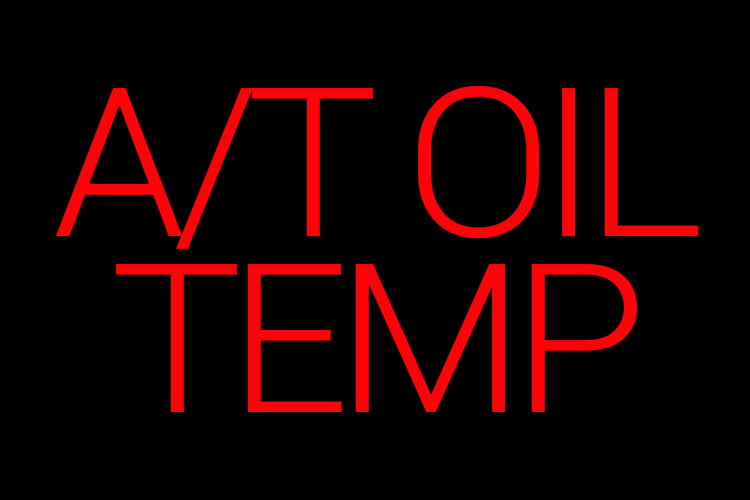
The transmission temperature indicator light comes on as a red thermometer between gears or “AT OIL TEMP” written next to it. It shows that the transmission system is overheating. You should pool over at that very moment when this light comes on. This problem may be caused by low fluid levels, sustained heavy towing, worn-out internal components, and high mileage.
READ MORE: Low transmission fluid: Symptoms, causes, and repair guide
Cruise Control Indicator
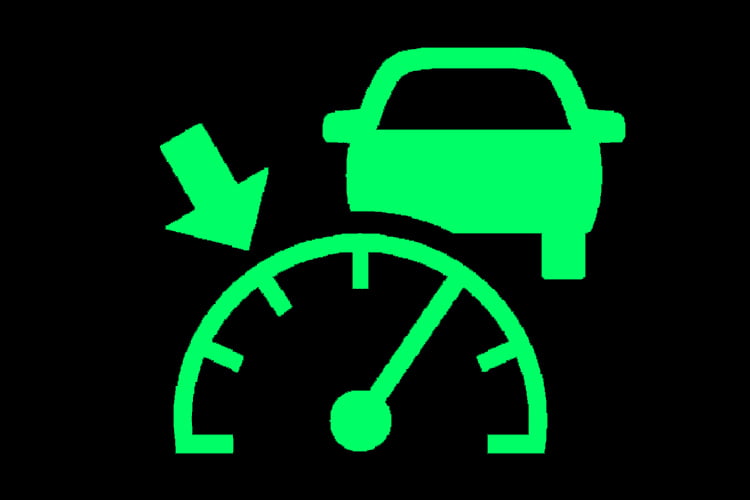
The cruise control indicator illuminates with a speedometer symbol. It shows different conditions depending on the color. Green means the cruise control is in action, while yellow or amber color may indicate that it’s enabled but not set. It can also be an indication of a problem with the system. Refer to your care manual to know what it means in your car.
Loose Gas Cap Indicator
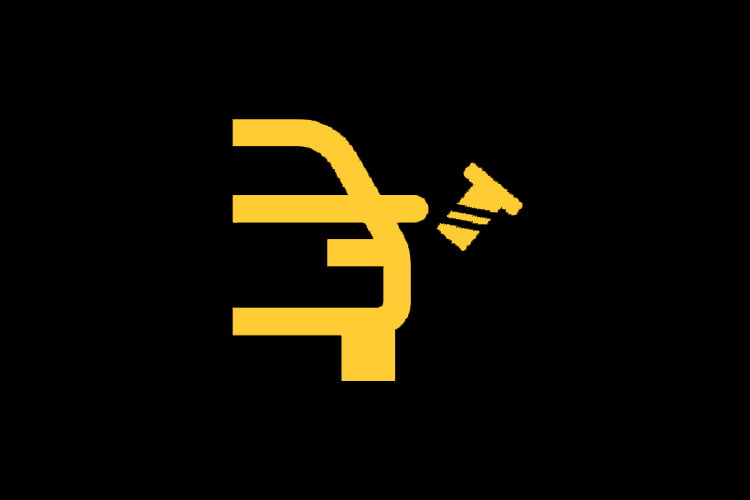
This yellow symbol features a section of the car around the fuel tank and an unfitted gas cap. If it comes on, just pool over and fit the gas cap. A loose gas cap means you will be losing your fuel or gas through evaporation. It can also trigger check engine light, as already mentioned.
Slip Or Stability Control Indicator
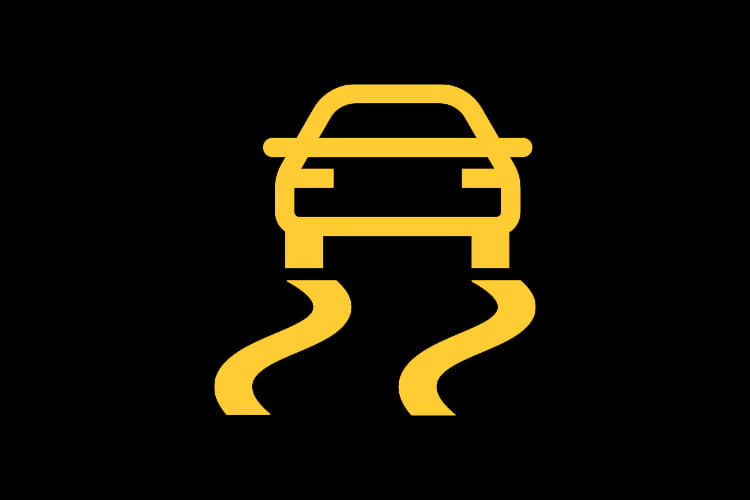
A slip or stability, or traction, control indicator is a yellow light of a vehicle and two wavy lines behind the wheels. It shows that your traction or stability control system has been activated. In some car models, the symbol flashes irregularly to show that it’s at work.
The traction control system uses the anti-lock brake system to stabilize your vehicle. It’s usually activated automatically in rainy or snowy conditions to prevent possible slip.
Headlamp Indicator
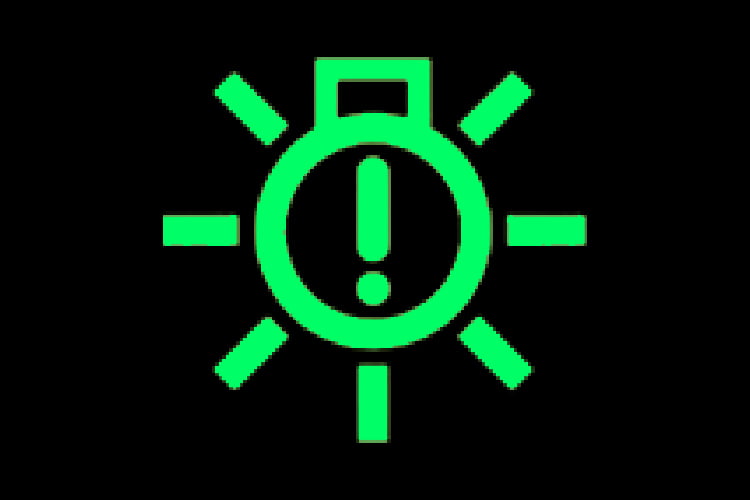
The headlamp indicator illuminates green when the switch is engaged. It’s symbolized by a beam at an angle to a lamp head. This indicates a proper functioning headlamp. If one of the lamps has burned or malfunctions, a green or amber bulb with an exclamation mark will turn on instead. That problem should be fixed as soon as possible.
High Beam Indicator

The high beam indicator light is one of the few blue lights you will ever see on your dashboard. It’s activated when the high beam light is turned on. Unlike headlamp or fog lamp indicators, high beam indicators are symbolized by horizontal parallel lines and a lamp head.
Turn Signal Indicator

These are green, arrow-shaped lights. They come on when you activate a turn switch to alert other drivers that you want to take a turn. They come in pairs. The right one will illuminate if you indicate a right turn, and a left turn comes on when you trigger a left turn switch. They will also come on as appropriate when you want to switch lanes on a highway. Both right and left turn signal indicators can only be on when the hazard switch is activated.
Red Warning Lights
| Dashboard warning light | Name | Message |
|---|---|---|
 | Charging System Trouble Light | Serious Charging System problem. The vehicle should be brought to a complete stop as quickly as possible or the vehicle may simply stop running. |
 | Charging System Trouble Light | The vehicle's hybrid battery must be serviced by your dealer or qualified service professional as soon as possible. |
 | Brake Trouble Light | A serious problem with the brakes. The light will also be on when the hand, or emergency, brake is engaged. |
 | Brake Trouble Light | A serious problem with the brakes. The light will also be on when the hand, or emergency, brake is engaged. |
 | Brake Trouble Light | A serious problem with the brakes. The light will also be on when the hand, or emergency, brake is engaged. |
 | Oil Warning Lights | Without the wavy line, your engine is telling you that the oil pressure is low. |
 | Oil Warning Lights | A wavy line below the oil can indicates the oil level is low. |
 | Oil Warning Lights | If it is seen on the instrument panel, pull over and shut down the engine as soon as possible to allow it to cool down. |
 | Temperature Warning Indicators | The engine temperature is too high. Should stop the vehicle and turn off the engine. Turning on the heater to the highest setting will remove some of the heat as well. |
 | Power Steering Trouble Light | |
 | Power Steering Trouble Light | Pull over as soon as possible and shut down the engine and restart it. |
 | SRS Air Bag Indicator | A problem exists with one of the many airbags in the vehicle, which should be taken to the dealer or authorized service center as soon as possible. |
 | SRS Air Bag Indicator | A problem exists with one of the many airbags in the vehicle, which should be taken to the dealer or authorized service center as soon as possible. |
 | Seat Belt Reminder Indicator | The indicators simply want you to put on your seat belt. |
 | Seat Belt Reminder Indicator | Showing two belted occupants, indicates either the driver or passenger is unbuckled. Regardless, the indicators simply want you to put on your seat belt. |
 | Security and Immobilizer System Indicator | The ignition switch is locked and will need the proper transponder-equipped key fob to start or re-start. |
 | Security and Immobilizer System Indicator | The ignition switch is locked and will need the proper transponder-equipped key fob to start or re-start. |
 | Security and Immobilizer System Indicator | Indicates a malfunction in the security system. |
 | Door Ajar and Other Open Indicator | Close the door, trunk lid, rear hatch, hood, or whatever is shown as open as soon as possible. |
 | Door Ajar and Other Open Indicator | The ignition is on and Driver’s Door is the one open. So long as the vehicle is not in gear, there should be nothing to be concerned about. |
 | Hood Ajar indicators | Be sure the hood is closed and/or that nothing is preventing the hood from fully closing. |
 | Master Warning Light Indicators | Simple reminders such as a door ajar or that it is time to change the oil. |
 | Electric Park Brake and Fault Indicator | Service is needed. |
 | Electric Park Brake and Fault Indicator | Service is needed. |
 | Keyless Ignition Detection Indicator | Indicates that the key is not detected. |
 | Tire Pressure Monitoring System Indicator | The pressure in a tire can be very, very low and not result in a large change in the handling of some vehicles. |
 | A/T Park Warning Indicator | A vehicle's 4 wheel drive shifter is in neutral (N). A drive gear cannot be engaged until either the 4 Low or the 4 High option is chosen. |
 | Transmission Oil Temperature Indicators | The oil temperature in the transmission is too high, which risks transmission failure. |
 | Transmission Oil Temperature Indicators | The oil temperature in the transmission is too high, which risks transmission failure. |
 | Transmission Oil Temperature Indicators | A transmission in a number of instances. Again, pull over and allow the transmission to cool down or there is a risk of failure. |
 | Lane Departure Warning Indicators | The vehicle crosses the line without having used a turn signal. |
 | Collision Warning System and Malfunction Indicators | The system has been deactivated. |
 | Collision Warning System and Malfunction Indicators | The system has been deactivated. |
Yellow Indicator Lights
| Dashboard warning light | Name | Message |
|---|---|---|
 | Electric Park Brake and Fault Indicator | Service is needed. |
 | Electric Park Brake and Fault Indicator | Service is needed. |
 | Electric Park Brake and Fault Indicator | Service is needed. |
 | Electric Park Brake and Fault Indicator | Service is needed. |
 | Electric Park Brake and Fault Indicator | Service is needed. |
 | Electric Park Brake and Fault Indicator | The brake is engaged and the ignition on. |
 | Electric Park Brake and Fault Indicator | The brake is engaged and the ignition on. |
 | Electric Park Brake and Fault Indicator | The brake is engaged and the ignition on. |
 | Electric Park Brake and Fault Indicator | The brake is engaged and the ignition on. |
 | Oil Warning Lights | "An admonition to check the oil. If the oil level is good, the engine needs servicing as soon as possible as an oil pump failure is likely and will lead to serious engine damage." |
 | Oil Warning Lights | "An admonition to check the oil. If the oil level is good, the engine needs servicing as soon as possible as an oil pump failure is likely and will lead to serious engine damage." |
 | Oil Warning Lights | "The engine‚a RPM has been reduced. Low oil pressure can result in serious engine damage, even at reduced RPMs, so have the engine serviced as soon as possible." |
 | Temperature Warning Indicators | "The engine temperature is too high. Stop the vehicle and turn off the engine. Turning on the heater to the highest setting will remove some of the heat as well." |
 | Temperature Warning Indicators | Fuel having entered the engine oil. Run the engine until warm to allow the fuel to evaporate. Also, avoid running at a high rpm as well. |
 | Power Steering Trouble Light | |
 | SRS Air Bag Indicator | A problem exists with one of the many airbags in the vehicle, which should be taken to the dealer or authorized service center as soon as possible. |
 | Second Row or Rear Seat Safety Belt Indicator | A rear seat passenger is detected |
 | Security and Immobilizer System Indicator | The ignition switch is locked and will need the proper transponder-equipped key fob to start or re-start. |
 | Security and Immobilizer System Indicator | The ignition switch is locked and will need the proper transponder-equipped key fob to start or re-start. |
 | Security and Immobilizer System Indicator | The ignition switch is locked and will need the proper transponder-equipped key fob to start or re-start. |
 | Fuel, Low Fuel, and Fuel Sensor Indicators | |
 | Fuel, Low Fuel, and Fuel Sensor Indicators | |
 | Fuel, Low Fuel, and Fuel Sensor Indicators | |
 | Low Windshield Washer Fluid Indicators | Fill the windshield washer fluid reservoir as soon as possible. |
 | Low Windshield Washer Fluid Indicators | Fill the windshield washer fluid reservoir as soon as possible. |
 | Low Windshield Washer Fluid Indicators | Fill the windshield washer fluid reservoir as soon as possible. |
 | Low Windshield Washer Fluid Indicators | Fill the windshield washer fluid reservoir as soon as possible. |
 | Check Engine Light | |
 | Check Engine Light | |
 | Check Engine Light | Check that the gas cap is installed and properly tightened (make sure it clicks at least once). |
 | Check Engine Light | Indicates a fault in an emissions related electronic system. |
 | Check Engine Light | Meant to convey a likely issue with the engines electrical system. |
 | Check Engine Light | Meant to convey a likely issue with the engines electrical system. |
 | Check Engine Light | Meant to convey a likely issue with the engines electrical system. |
 | Check Engine Light | A minor engine fault has been detected |
 | Check Engine Light | |
 | Slip, Stability Control and Fault Indicator | When a vehicle detects slippery conditions, its stability or traction control system is activated. The light will flash, irregularly in some vehicles, indicating that the system is doing its work, helping to keep the vehicle in control. |
 | Slip, Stability Control and Fault Indicator | When a vehicle detects slippery conditions, its stability or traction control system is activated. The light will flash, irregularly in some vehicles, indicating that the system is doing its work, helping to keep the vehicle in control. |
 | Slip, Stability Control and Fault Indicator | When a vehicle detects slippery conditions, its stability or traction control system is activated. The light will flash, irregularly in some vehicles, indicating that the system is doing its work, helping to keep the vehicle in control. |
 | Slip, Stability Control and Fault Indicator | When a vehicle detects slippery conditions, its stability or traction control system is activated. The light will flash, irregularly in some vehicles, indicating that the system is doing its work, helping to keep the vehicle in control. |
 | Stability Control Off Indicators | The stability control system is deactivated. |
 | Stability Control Off Indicators | The stability control system is deactivated. |
 | Stability Control Off Indicators | There is clearly a problem that should be addressed as soon as possible. |
 | Tire Pressure Monitoring System Indicators | The inflation on one of the tires is reduced about 25% or more. In most cases, that will be about eight pounds |
 | Tire Pressure Monitoring System Indicators | The system needs to be reset or could mean that a tire is low as well. Regardless, the tire pressures must be checked for the sake of safety. |
 | Antilock Braking System Trouble Lights | The ABS system helps to keep the car from skidding out of control during braking in slippery or extreme braking conditions by limiting your wheels from locking up. |
 | Antilock Braking System Trouble Lights | The ABS system helps to keep the car from skidding out of control during braking in slippery or extreme braking conditions by limiting your wheels from locking up. |
 | Antilock Braking System Trouble Lights | In slippery conditions, the driver must control any tendency for the wheels to lock during braking. |
 | Antilock Braking System Trouble Lights | Indicate a problem with the 4- or All-wheel Drive system as well as the ABS System. If this is the case, one or more additional indicators will be present. Have the vehicle checked as soon as possible by a competent shop. |
 | Antilock Braking System Trouble Lights | Come on when the ABS system is simply doing its job . It does not indicate a fault |
 | Collision Warning System and Malfunction Indicators | When the brakes are applied automatically, which would be obvious if it occurred! |
 | Collision Warning System and Malfunction Indicators | When the brakes are applied automatically, which would be obvious if it occurred! |
 | Collision Warning System and Malfunction Indicators | When the brakes are applied automatically, which would be obvious if it occurred! |
 | Collision Warning System and Malfunction Indicators | The end result is yet another advanced system that has managed to resist finding a standardized name. The systems discussed here use radar while others use cameras, which can be found here. These systems, and those that follow, are all moving in the direction of automatic braking, which all manufacturers have promised to install in all passenger vehicles by roughly 2020. Regardless of name or acronym, the systems, if fitted, minimize the risk of injury if a crash becomes unavoidable. The vehicle will alter its suspension and brake settings (apply the brakes) and the front seat belts are tightened. If one of these indicator symbols is shown on your instrument cluster, it indicates a problem with the system and the vehicle should be taken to your dealer or authorized repair facility. |
 | Collision Warning System and Malfunction Indicators | The end result is yet another advanced system that has managed to resist finding a standardized name. The systems discussed here use radar while others use cameras, which can be found here. These systems, and those that follow, are all moving in the direction of automatic braking, which all manufacturers have promised to install in all passenger vehicles by roughly 2020. Regardless of name or acronym, the systems, if fitted, minimize the risk of injury if a crash becomes unavoidable. The vehicle will alter its suspension and brake settings (apply the brakes) and the front seat belts are tightened. If one of these indicator symbols is shown on your instrument cluster, it indicates a problem with the system and the vehicle should be taken to your dealer or authorized repair facility. |
 | Collision Warning System and Malfunction Indicators | The end result is yet another advanced system that has managed to resist finding a standardized name. The systems discussed here use radar while others use cameras, which can be found here. These systems, and those that follow, are all moving in the direction of automatic braking, which all manufacturers have promised to install in all passenger vehicles by roughly 2020. Regardless of name or acronym, the systems, if fitted, minimize the risk of injury if a crash becomes unavoidable. The vehicle will alter its suspension and brake settings (apply the brakes) and the front seat belts are tightened. If one of these indicator symbols is shown on your instrument cluster, it indicates a problem with the system and the vehicle should be taken to your dealer or authorized repair facility. |
 | Collision Warning System and Malfunction Indicators | Dirt on the sensors or cameras in the front of the vehicle and often a simple car wash or cleaning will resolve the issue |
 | Brake Hold Indicator | Indicate a fault in the system |
 | Brake Hold Indicator | Indicate a fault in the system |
 | Brake Hold Indicator | The system is not available. |
 | Active or Advanced Cruise Control Indicators | Actually adjusting the distance to a vehicle ahead. |
 | Active or Advanced Cruise Control Indicators | Actually adjusting the distance to a vehicle ahead. |
 | Active or Advanced Cruise Control Indicators | Actually adjusting the distance to a vehicle ahead. |
 | Active or Advanced Cruise Control Indicators | Intended to imply a forward looking radar. |
 | Active or Advanced Cruise Control Indicators | Intended to imply a forward looking radar. |
 | Active or Advanced Cruise Control Indicators | A fault in the system. |
 | Low Speed, Grade and Terrain Assist Indicator | |
 | Low Speed, Grade and Terrain Assist Indicator | A problem with the Hill Start Assist system. |
 | 4 Wheel Drive Indicators | Indicates that the 4 wheel drive is engaged at a low gear ratio. It is useful when maximum power or traction is needed for steep climbs, sandy or muddy conditions, or off-road driving. |
 | 4 Wheel Drive Indicators | Indicates that the 4 wheel drive is engaged at a low gear ratio. It is useful when maximum power or traction is needed for steep climbs, sandy or muddy conditions, or off-road driving. |
 | 4 Wheel Drive Indicators | Indicates that the 4 wheel drive is engaged at a low gear ratio. It is useful when maximum power or traction is needed for steep climbs, sandy or muddy conditions, or off-road driving. |
 | 4 Wheel Drive Indicators | Indicates that the 4 wheel drive is engaged at a low gear ratio. It is useful when maximum power or traction is needed for steep climbs, sandy or muddy conditions, or off-road driving. |
 | Differential and Axle Lock Indicators | The option to lock the differential may be available in an all-wheel drive vehicle. Turn it on only if you become stuck in mud or snow, or if you are driving on a loose surface off road at low speeds. A symbol featuring all four wheels will appear on the instrument panel when the lock is in use. |
 | Differential and Axle Lock Indicators | The option to lock the differential may be available in an all-wheel drive vehicle. Turn it on only if you become stuck in mud or snow, or if you are driving on a loose surface off road at low speeds. A symbol featuring all four wheels will appear on the instrument panel when the lock is in use. |
 | Differential and Axle Lock Indicators | The option to lock the differential may be available in an all-wheel drive vehicle. Turn it on only if you become stuck in mud or snow, or if you are driving on a loose surface off road at low speeds. A symbol featuring all four wheels will appear on the instrument panel when the lock is in use. |
 | Tow or Haul Mode and Fault Indicators | If your vehicle is equipped with Tow Mode, one of these lights will be lit when the mode is selected. |
 | Tow or Haul Mode and Fault Indicators | If your vehicle is equipped with Tow Mode, one of these lights will be lit when the mode is selected. |
 | Active, Adaptive and Cornering Light Malfunction | |
 | Active, Adaptive and Cornering Light Malfunction | |
 | Active, Adaptive and Cornering Light Malfunction | |
 | Lamp Out Indicator Symbol | One or more of the headlamp bulbs or other bulbs is burned out or malfunctioning |
 | Lamp Out Indicator Symbol | One or more of the headlamp bulbs or other bulbs is burned out or malfunctioning |
 | Lamp Out Indicator Symbol | The problem is with a low (dipped) beam light. |
 | Headlamp Leveling System Warning | Indicates a problem with the system. The vehicle should be taken to your dealer or authorized service center. |
 | Headlamp Leveling System Warning | Indicates a problem with the system. The vehicle should be taken to your dealer or authorized service center. |
 | Automatic Headlight Dimmer or Malfunction Indicator | Continue to function in high or low beam, but they will need to be cycled manually. |
 | Automatic Headlight Dimmer or Malfunction Indicator | Use as an Automatic Wiper Fault Indicator |
 | Rear Fog Lamp Indicator | When the lamps are actually on |
Green Indicator Lights
| Dashboard warning light | Name | Message |
|---|---|---|
 | Security and Immobilizer System Indicator | The ignition switch is locked and will need the proper transponder-equipped key fob to start or re-start. Flash when the vehicle is immobilized. |
 | Brake Hold Indicator | The system is on and functioning properly. |
 | Brake Hold Indicator | The system is on and functioning properly. |
 | Brake Hold Indicator | The system is on and functioning properly. |
 | Active or Advanced Cruise Control Indicators | The system is responding to traffic ahead and the arrow indicates a speed has been set. |
 | Active or Advanced Cruise Control Indicators | The system is responding to traffic ahead and the arrow indicates a speed has been set. |
 | Active or Advanced Cruise Control Indicators | The system is responding to traffic ahead and the arrow indicates a speed has been set. |
 | Cruise or Speed Control Text Indicators | The cruise control is engaged. It is perfectly straightforward, as opposed to the two image symbols below that are now often used in its place. |
 | Cruise or Speed Control Text Indicators | The cruise control is engaged. It is perfectly straightforward, as opposed to the two image symbols below that are now often used in its place. |
 | Turn Assist Indicator | When the function is active and the green color only says it is operating. |
 | Drive Mode Indicator | |
 | Drive Mode Indicator | |
 | 4 Wheel Drive Indicator | Indicates that the 4 wheel drive is engaged at a low gear ratio. It is useful when maximum power or traction is needed for steep climbs, sandy or muddy conditions, or off-road driving. |
 | Tow or Haul Mode and Fault Indicators | Find the proper switch to turn it off, or, lacking a switch, check with a service center. |
 | Tow or Haul Mode and Fault Indicators | Find the proper switch to turn it off, or, lacking a switch, check with a service center. |
 | Headlamp Indicator | The headlamps are turned on. |
 | Lamp Out Indicator | One or more of the headlamp bulbs or other bulbs is burned out or malfunctioning |
 | Park Lamp or Tail Light (Canada) Indicator | All the lights, except the headlights, are in use. |
 | Fog Lamp Indicator | The fog lamps are activated. |
 | Turn Signal Indicator | |
 | Low Beam On indicator | |
 | Automatic Headlight Dimmer or Malfunction Indicator | Indicates that the high beams are on and that the system will automatically (AUTO or A) switch between the low and high headlight beams on the automobile depending on whether or not sensors detect oncoming vehicle head lights in the distance. |
 | Automatic Headlight Dimmer or Malfunction Indicator | Indicates that the high beams are on and that the system will automatically (AUTO or A) switch between the low and high headlight beams on the automobile depending on whether or not sensors detect oncoming vehicle head lights in the distance. |
Blue Indicator Lights
| Dashboard warning light | Name | Message |
|---|---|---|
 | Temperature Warning Indicator | Indicates that the coolant temperature is below what is needed for optimum performance. |
 | Automatic Headlight Dimmer or Malfunction Indicator | The high beams are on and that the system will automatically (AUTO or A) switch between the low and high headlight beams on the automobile depending on whether or not sensors detect oncoming vehicle head lights in the distance. |
 | Automatic Headlight Dimmer or Malfunction Indicator | The high beams are on and that the system will automatically (AUTO or A) switch between the low and high headlight beams on the automobile depending on whether or not sensors detect oncoming vehicle head lights in the distance. |
 | Automatic Headlight Dimmer or Malfunction Indicator | The auto high beam system on |
 | High or Low Beam on Indicators | The light is active only when the high beams are active (turned on) and has been a standard in vehicles for decades. |
 | High or Low Beam on Indicators | The light is active only when the high beams are active (turned on) and has been a standard in vehicles for decades. |
White/Grey Indicator Lights
| Dashboard warning light | Name | Message |
|---|---|---|
 | Tire Pressure Monitoring System Indicator | Illuminates to confirm that the load setting is selected. |
 | Collision Warning System and Malfunction Indicator | When the brakes are applied automatically, which would be obvious if it occurred! |
| Collision Warning System and Malfunction Indicator | Points to debris blocking the camera at the front of the vehicle, and again a car wash is likely all that is needed. | |
 | Brake Hold Indicator | The system is on and functioning properly. |
 | Brake Hold Indicator | The system is on and functioning properly. |
 | Active or Advanced Cruise Control Indicator | The system is turned on and amber when actually adjusting the distance to a vehicle ahead. |
 | Active or Advanced Cruise Control Indicator | The speed is set. |
 | Active or Advanced Cruise Control Indicator | Indicate a problem with the Smart or Active Cruise Control system that your dealer will need to resolve. |
 | Automatic Headlight Dimmer or Malfunction Indicator | The high beam system off. The park lights are on |
 | Automatic Headlight Dimmer or Malfunction Indicator | The high beam system off |
Conclusion
Understanding the dashboard symbols can help you save hundreds or thousands of dollars on car maintenance and repair. Just know which symbols and symbol colors show severe conditions or require immediate attention. Apart from the lights that come on when different systems are engaged or activated, all others need a mechanical checkup. Fix the problem as soon as possible.